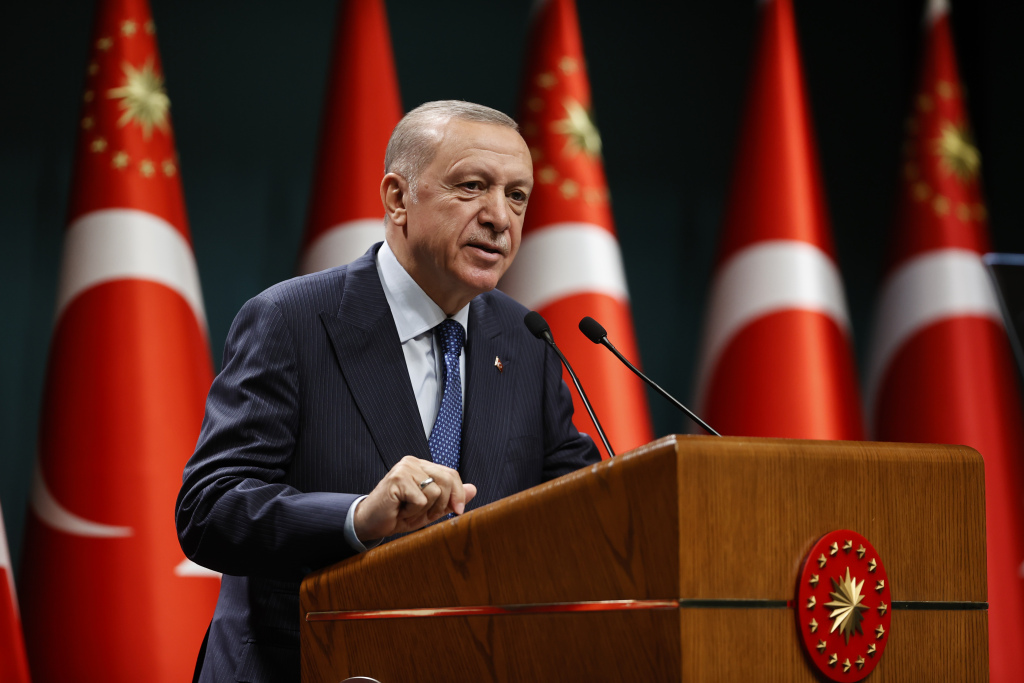Turkiye's recalibration of foreign policy
- By George N. Tzogopoulos
 0 Comment(s)
0 Comment(s) Print
Print E-mail China.org.cn, August 30, 2022
E-mail China.org.cn, August 30, 2022

In recent years, Turkiye has steadily followed an independent foreign policy. Although a NATO member-state, it manages to develop a mode of harmonious collaboration with Russia. For example, during the ongoing Ukraine conflict, the Turkish government does not agree with the policy of sanctions. On the contrary, it prefers to stay rather neutral in a manner that allows it to mediate potential solutions.
Several meetings between Russian and Ukrainian delegations have been held in Turkish cities. A few days ago, Istanbul hosted a significant round of discussions which led to the start of operation of the Joint Coordination Centre (JCC), which will help implement the UN-brokered deal to resume exports of Ukrainian grain via the Black Sea.
The evolution of Turkish foreign policy under President Tayyip Erdogan is grounded in the determination to toughly negotiate in the international scene. In so doing, Turkiye has decided to link the potential NATO membership of Finland and Sweden to some of its security priorities. The trilateral memorandum signed on June 28 froze Turkish reservations. Among other things, Finland and Sweden agreed that they would not provide support to specific Kurdish defense and political units in Syria, as well as the organization Turkiye considers to have orchestrated the failed coup of July 2016.
The three countries have established a dialog mechanism to discuss the practical implementation of the measures agreed upon, but the process is not over yet. Erdogan warned in mid-July that Ankara might still block the NATO membership of Helsinki and Stockholm should they not keep their promises. Towards the end of the month, he also said that his country would not be prepared to make compromises.
The ongoing situation goes beyond Turkish demands vis-à-vis Finland and Sweden and covers a much broader theme, such as the nature of Turkiye's relations with the U.S. and the EU. Although both the U.S. and the EU wish to keep the country on a Western trajectory, they are concerned about its choices. The Turkish government, for its part, aspires to anchor its collaboration with the West in the new conditions that enable it to balance between the West and the East.
Against this backdrop, Washington and Ankara have already set up a new strategic mechanism to review topics of common interest. EU-Turkiye relations are taking a similar course. The Strategic Compass document of last April mentions that the EU would continue to cooperate with Turkiye, "a contributor to Common Security and Defense (CSDP) missions and operations." Nonetheless, complicated problems perplex matters. The Cyprus Question remains unresolved. Additionally, the EU is verbally supporting Greece and the Republic of Cyprus against Turkish claims in the Eastern Mediterranean. The Strategic Compass makes a reference to the need of "sustained de-escalation" in line with the relevant statement of the European Council of March 25, 2021.
Turkiye seeks to take part in European military projects, including the so-called Permanent Structured Cooperation (PESCO). The aforementioned trilateral memorandum stipulates that Finland and Sweden support Turkish participation. However, other EU member-states such as Austria have appeared skeptical. More importantly, France is wary of Turkish strategic objectives in the Mediterranean and the Middle East. French-Turkish tensions were a recurrent phenomenon, especially in 2020 and 2021.
In the context of the Ukraine crisis, Turkish-French relations have demonstrated some signs of improvement. President of France Emmanuel Macron and his Turkish counterpart Erdogan do regularly hold telephone conversations. Of course, it has to be seen whether this bilateral amelioration will acquire a substantial and permanent basis.
The recalibration of Turkish foreign policy imposes a serious dilemma for the West. The U.S. and the EU can either engage in a continuous bargain with Ankara, accept some of the latter's terms, and proceed together or adopt a rigid position that will not allow any deviations from standard policies and will consider antagonism with Turkiye an irreversible trend. Both scenarios entail risks and opportunities for all sides involved.
George N. Tzogopoulos is a columnist with China.org.cn. For more information please visit:
http://www.ccgp-fushun.com/opinion/GeorgeNTzogopoulos.htm
Opinion articles reflect the views of their authors, not necessarily those of China.org.cn.
If you would like to contribute, please contact us at opinion@china.org.cn.





